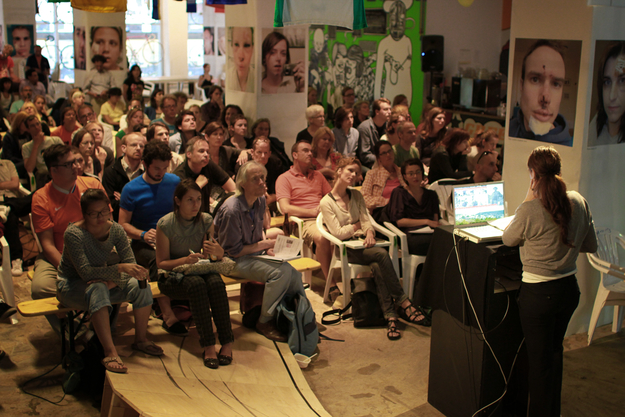Mapping for Change
The subject of the first evening of Map Fest was baptized “Mapping for Change”. 'The word 'change' doesn't just mean the replacing of one thing with another, but is also always loaded with political connotations, not only after Obama's PR staff made it its campaign slogan. Both meanings of the term 'change' (the aesthetic and the political) were in the center of the Mapping for Change lectures.
Malkit Shoshan
Israelian architect Malkit Shoshan, director of FAST, the “Foundation for Achieving Seamless Territory”, talked about the “Atlas of the conflict Israel-Palestine”. This 'atlas' maps the spatial movements in Israel/Palestine throughout the 20th century. These objective spatial movements are signifiers of political movements. But whereas the political decision making process is rather intelligible, covered by mass media, that what precedes it isn't so clearly 'represented'. The Atlas is a way of focusing on the latter: its real decisiveness in distributing social (in)equality.


Annelys de Vet
Annelys de Vet has published several subjective atlases, both of the EU and The Netherlands, as well as of Palestine and Serbia, and is currently working on atlases of other countries. Her strategy: a bottom-up approach. Just like Malkit, she aims at constructing alternatives to the dominant ways of representing nations. Maps are made by an act of selection and exclusion. They play a role in the functioning of national symbolism, and create a certain and specific 'feeling of common ground'. Annelys wanted to create an atlas which would show exactly this process, in the hope of overcoming the self-mystifying aspect of map-making.


Christian Nold
Christian Nold is interested in how all kinds of global flows, such as money, influence and shape local communities. New means such as mapping can reveal their influence, and allow for an appropriation thereof by communities. He operates in the space between maps and mapping, two distinct although interrelated operations. Mapping is something intrinsically part of every community. A map is perhaps no more than a temporarily fixed or stabilized result of this process, but partly inadequate precisely because of this aspect.
The Bijlmer Euro is a project which deals with the issues mentioned above. It combines Euro banknotes, and the already present RFID tags in disposable public transport cards. Everyone can make a Bijlmer Euro, by extracting the tag and sticking it to a banknote. The tracking system now tracks money flows, rather than people. But the cognitive value of knowing where your money goes (often the sole focus of data-visualization) seems to be less important than the practical and real-life consequences in the Bijlmer community, the transformation of social relations that it evokes. As Christian said: 'New tools, new relations.'

Wietske Maas
Whereas Christian Nold works with the movements of the 'noosphere', Wietske Maas focuses on the underlying bio- and ecological processes that inhabit the urban landscape (see Urbanibalism). The question they both seem to raise is: How can we meaningfully capture, represent, make effective, and appropriate these ephemeral and phantom-like flows that are both abstract and most concrete? Wietske is currently working as artist in residence for Casco, within the ongoing project “The Grand Domestic Revolution”. She researches the plant life of Utrecht, and traces the things that keep on living despite urban planning. The unexpected anomalies of city life.

Concluding Map Fest evening 1
The different projects presented today are all dealing with complex systems and processes unintelligible to the bare senses. Systems that are distributed spatially as well as temporally in a highly mediated and fragmented fashion. The impossibility of making those systems or processes intelligible on a human scale, makes mapping necessary. For only if we can see what is going on, or know that what we see is partly determined by how it is presented, can we start to ask questions. And more important: give radically different answers. Our world is very much constituted by these sorts of complex processes. If 'politics' means: making things visible in ways different from the established status quo, so that the latter can be renegotiated, mapping is relevant (leaving the problem of real effectiveness aside). It is this implicit line of thinking which I most recognized among the artists who presented their work tonight.
More information
Map Fest 2010 took place on July 6, 8 and 9 at Mediamatic Bank.
Read about Map Fest evening 2 (Mapping for Clarity) here.
Read about Map Fest evening 3 / Ignite Amsterdam #1 here.


